March 18 to March 24
After fighting in the jungles of Myanmar for 12 years, Yang Tien (楊沺) did not want to come to Taiwan, which was much further away from Yunnan, his homeland. But by 1960, things were not looking good for him and his anti-communist troops loyal to the Chinese Nationalist Party (KMT). They had kept the Myanmar Army at bay for many years, but the enemy had now joined forces with China’s People’s Liberation Army (PLA).
The Second Army Yang belonged to eventually fled to Laos, where they were ordered by KMT leader Chiang Kai-shek (蔣介石), who was under US pressure, to retreat to Taiwan.
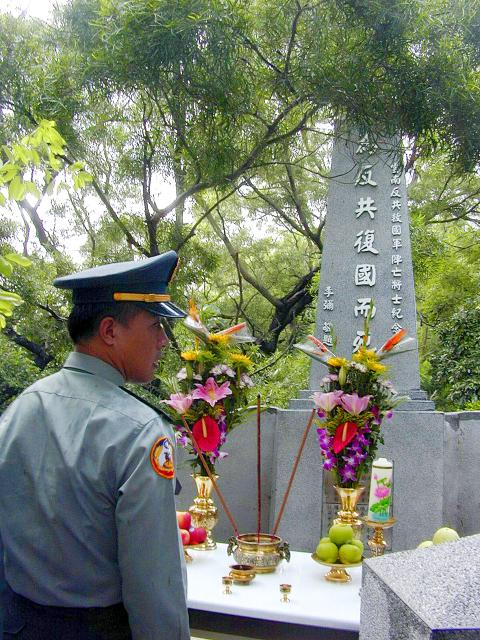
Photo: Hung Chen-hung, Taipei Times
“The Third and Fifth Armies insisted on staying, and I wanted to stay too and keep fighting the communists,” Yang said in an oral history published by Nantou County’s Cingjing Farm (清境農場). The government resettled him in the Cingjing area long before it became today’s tourist hotspot, famous for its sheep shearing shows. “But an old comrade told me that he saw my wife getting on one of the planes. Only then did I change my mind.”
Yang arrived on March 27, 1961, reuniting with his wife a day later. By May, more than 4,000 troops and their families had joined him. Those who were married but childless or only had one child were settled in Cingjing, while the rest were sent to Kaohsiung, Pingtung, Taoyuan or continued to serve in the Republic of China (ROC) Army. Back then, the area around Cingjing was mostly uncultivated forest land, and life was tough even with government assistance.
But they no longer had to fight.
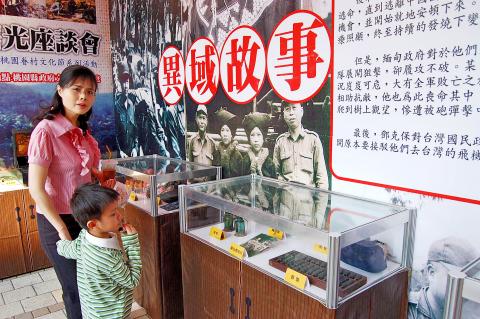
Photo: Chen Wen-cheng, Taipei Times
THE ‘LOST ARMY’
Unlike most of his comrades in Myanmar, Yang did not participate in the Chinese Civil War. The Yunnan native fled south after the communist victory and joined the thousands of KMT troops who refused to surrender. They were led by General Lee Mi (李彌), who organized them into the Yunnanese Anti-Communist National Salvation Army (雲南人民反共救國軍), which reported directly to the Minister of Defense.
In 1951, Chiang sent a telegram to General Lee, stating that the KMT had built up Taiwan as “Asia’s strongest anti-communist power,” and were ready to strike back to reclaim China.
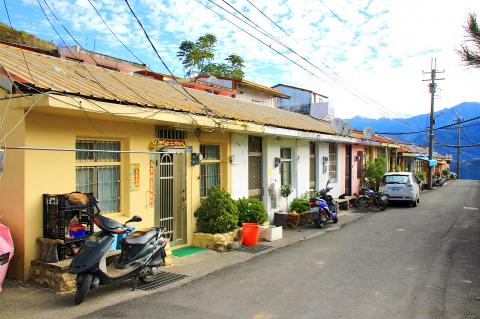
Photo: Tung Chen-kuo, Taipei Times
“The government cannot provide much aid to you … but when we do retake China, all organized anti-communist forces will enjoy the same privileges and rewards as the regular army … To save the country, save our people and save yourself and to fulfill our sacred duty of eradicating communism, my dear revolutionaries, you must stay strong and endure so we can claim the final victory.”
The army successfully invaded Yunnan that year, but were driven back to Myanmar in just two months. In March 1953, the Myanmar Army launched an offensive against the troops, only to be defeated. Realizing that they couldn’t win by force, Myanmar submitted to the UN a “Complaint by the Union of Burma regarding aggression against her by the Kuomingtang [KMT] government of Formosa.”
To appease the UN, Chiang ordered 2,000 of the soldiers and their families, as well as POWs and refugees, to retreat to Taiwan in 1953. However, this only involved one-third of the KMT forces as another 4,000 were secretly instructed by Chiang to remain in Myanmar. The government explained to the international community that it had no control over the troops who declined to return, painting them as rogue soldiers.
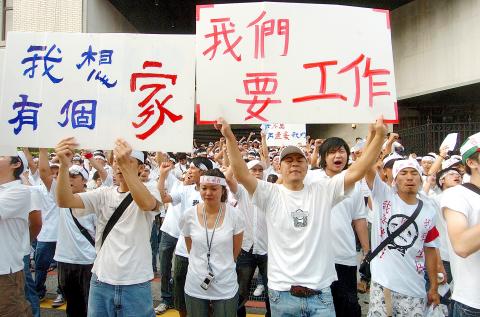
Photo: Chang Chia-ming, Taipei Times
This first group, consisting of between 6,600 and 7,200 people, was largely resettled in Jhongjhen New Village (忠貞新村) in Chungli. Today, Yunnanese cuisine is still prominent in the village; the Yunnan Cultural Park (雲南文化公園) was built in 2013 to commemorate their heritage.
The remaining KMT troops continued to operate in Myanmar until that country’s army joined forces with the PLA, which overwhelmed the KMT troops. The US became involved, and sternly instructed Chiang to either send the troops to Taiwan or disarm them and settle them in the Golden Triangle. Beginning on March 17, 1961, over 4,000 people headed for Taiwan.
While General Lee Wen-huan’s (李文煥) Third Army insisted on staying behind, General Tuan Hsi-wen’s (段希文) Fifth Army was about to retreat when he received orders to stay. Without aid, he led his troops to northern Thailand where they settled in the area around today’s Mae Salong, a cultural oddity in Thailand where Mandarin and Yunnanese are the main languages spoken.
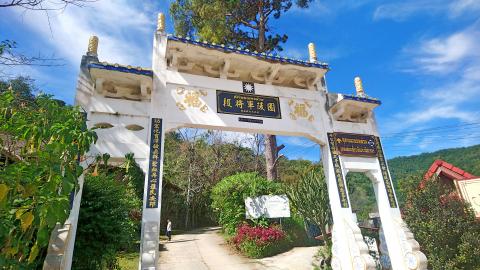
Photo: Han Cheung, Taipei Times
SOLDIERS TO FARMERS
Yang and his comrades no longer had to fear for their survival in Taiwan, but life didn’t seem much easier. In historian Sung Kuang-yu’s (宋光宇) 1982 study, one respondent said: “Our real trials began in Taiwan. We were career soldiers, nobody knew how to farm … life was so hard that some mothers committed suicide with their child!”
“Look, we have large houses and paved roads now, but back then, there wasn’t even a tree here, and the land was strewn with giant rocks. How were we supposed to plant anything?” another said.
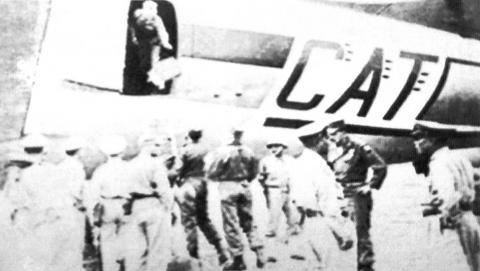
Photo courtesy of National Central Library
Today, many of their descendants still live in seven villages in the Cingjing area. Since many soldiers married ethnic minorities in Myanmar such as the Dai, Lahu, Lisu and Mien, their traditions were also brought to Taiwan and still persist, especially in the cuisine.
Those who stayed behind were gradually forgotten, living in difficult circumstances, fighting for the Thai government and trafficking opium to survive. Bo Yang’s (柏楊) popular novel, The Alien Realm (異域), and subsequent movie, A Home Too Far, brought their plight to national attention, and Taiwanese aid poured into the area to improve their conditions.
Many fought the local communists for the Thai government and were eventually rewarded with Thai citizenship, but others remained stateless. It was quite common for their descendants to head to Taiwan to study, upon which they would immediately receive ROC citizenship. However this provision was canceled in 1999, leaving hundreds of students stranded in Taiwan and unable to work. After repeated protests, the government finally began remedying the situation in 2009 by allowing them to reside in Taiwan legally and apply for citizenship after three years.
Taiwan in Time, a column about Taiwan’s history that is published every Sunday, spotlights important or interesting events around the nation that have anniversaries this week.

Taiwan has next to no political engagement in Myanmar, either with the ruling military junta nor the dozens of armed groups who’ve in the last five years taken over around two-thirds of the nation’s territory in a sprawling, patchwork civil war. But early last month, the leader of one relatively minor Burmese revolutionary faction, General Nerdah Bomya, who is also an alleged war criminal, made a low key visit to Taipei, where he met with a member of President William Lai’s (賴清德) staff, a retired Taiwanese military official and several academics. “I feel like Taiwan is a good example of

March 2 to March 8 Gunfire rang out along the shore of the frontline island of Lieyu (烈嶼) on a foggy afternoon on March 7, 1987. By the time it was over, about 20 unarmed Vietnamese refugees — men, women, elderly and children — were dead. They were hastily buried, followed by decades of silence. Months later, opposition politicians and journalists tried to uncover what had happened, but conflicting accounts only deepened the confusion. One version suggested that government troops had mistakenly killed their own operatives attempting to return home from Vietnam. The military maintained that the

Before the last section of the round-the-island railway was electrified, one old blue train still chugged back and forth between Pingtung County’s Fangliao (枋寮) and Taitung (台東) stations once a day. It was so slow, was so hot (it had no air conditioning) and covered such a short distance, that the low fare still failed to attract many riders. This relic of the past was finally retired when the South Link Line was fully electrified on Dec. 23, 2020. A wave of nostalgia surrounded the termination of the Ordinary Train service, as these train carriages had been in use for decades

Lori Sepich smoked for years and sometimes skipped taking her blood pressure medicine. But she never thought she’d have a heart attack. The possibility “just wasn’t registering with me,” said the 64-year-old from Memphis, Tennessee, who suffered two of them 13 years apart. She’s far from alone. More than 60 million women in the US live with cardiovascular disease, which includes heart disease as well as stroke, heart failure and atrial fibrillation. And despite the myth that heart attacks mostly strike men, women are vulnerable too. Overall in the US, 1 in 5 women dies of cardiovascular disease each year, 37,000 of them